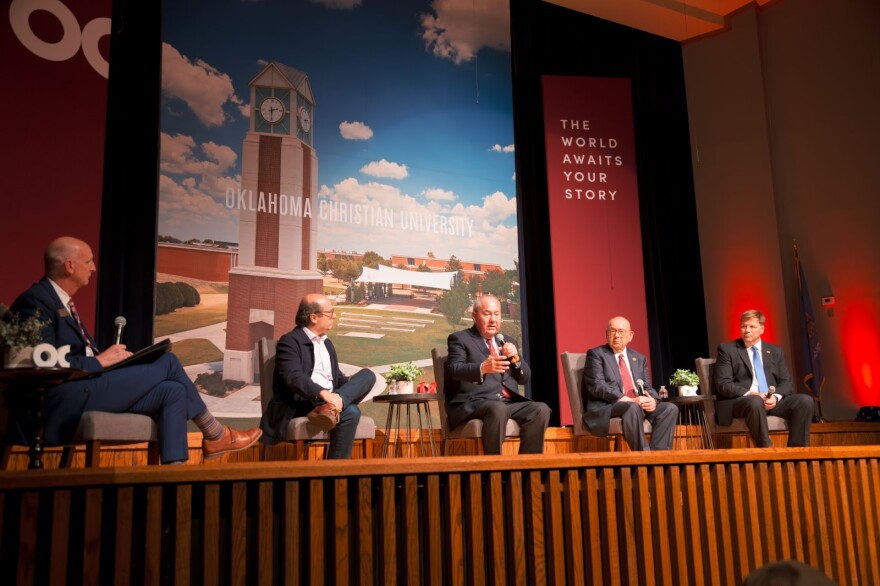The highly anticipated film adaptation of Killers of the Flower Moon comes out this week.
In advance, tribal nation leaders, federal law enforcement, and the book’s author David Grann got together to discuss it at an Oklahoma Christian University panel in Edmond.
Osage Nation Principal Chief Geoffrey Standing Bear, Chickasaw Nation Governor Bill Anoatubby and OKC’s FBI Special Agent in Charge Edward Gray had a lot to talk with Grann about related to his book and the upcoming movie.
Standing Bear said both Grann’s book and the new film have put a much-needed spotlight on the tragic murders of Osage people, and they’ve sparked conversations about improving mental health services in the tribal nation.
Martin Scorsese's adaption of Killers of the Flower Moon will be in wide release this Friday, Oct. 20. It centers on the relationship between Ernest and Mollie Burkhart. Burkhart was the nephew of William Hale, a lead conspirator in the plot to kill Osage citizens and steal their wealth. The pair were later convicted for their roles in that scheme.
The panel discussed the federal policies, jurisdictional issues and greed that precipitated the murders in the early 20th century among the Osages.
Standing Bear told the audience that Osage people went from being some of the wealthiest people in the country to struggling with poverty and mental health issues.
"I can tell you honestly, the Osage has been behind the timeline in facing up to the complicated issues of our stress, anxiety, all the issues that are so throughout our people," Standing Bear said in response to a question about how people can move forward from traumatic events like this. "And I'm learning a lot from these professionals that talk about generational trauma, the trauma of poverty."
Chickasaw Nation’s Anoatubby also reiterated the need for better mental health care for Indigenous people and talked about the developments the Chickasaw Nation has made.
"The tribe itself, the citizens of the tribe, suffer from generational trauma, and so it's a matter of healing. What does it take to heal people?" Anoatubby told the audience that the Chickasaw Nation's health care system has invested heavily in mental health care and integrated it into everything they do.
Even though Killers of the Flower Moon primarily documents the grift and corruption committed against the Osage, Anoatubby said the Five Tribes had similar experiences. He encouraged people to read Angie Debo's book And Still the Waters Run, which was published in the 1940s and documents some of the same crimes against Native people in Oklahoma going back to the 1800s.
FBI Special Agent Gray said some of the jurisdictional issues presented in the book are still relevant today.
"When you think about the FBI and the mission that we have, you really don't think about us working in murders and crimes on kidnappings and those types of things," Gray said. "You probably think about us being involved in joint terrorism task forces and financial crimes and all those types of things."
The FBI continues to enforce the Major Crimes Act, which says that any felony committed on Indian land is under the jurisdiction of the federal government.
Henry Roan — whose death is depicted in the film — was murdered on Indian land, and therefore the investigation came under the FBI's purview.
In the Osage murder case, one of the most instrumental undercover operatives was a Native American man named John Read.
"This has had a really large effect in the state of Oklahoma. I'm sure most everybody here is familiar with the SCOTUS ruling of McGirt v. Oklahoma in July of 2020, which exponentially expanded our responsibilities in the state of Oklahoma," Gray said.
Conversations like these are important, Grann said. All of these issues and their history need to be discussed. That’s especially important now in the wake of House Bill 1775, a 2021 law in Oklahoma that limits conversations about race and ethnicity in the classroom.
"I always believe that there is a collective responsibility for all of us to address our own ignorance," Grann said. "We're all fighting right now over what history can be taught and shouldn't be taught. History will always be there shaping us, whether we acknowledge it or not. If we don't address the past, if we don't reckon sometimes with the past, the good and the bad, the history will fester."
This report was produced by the Oklahoma Public Media Exchange, a collaboration of public media organizations. Help support collaborative journalism by donating at the link at the top of this webpage.






